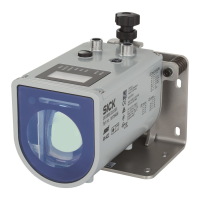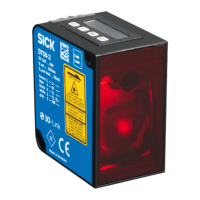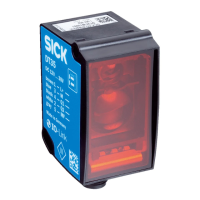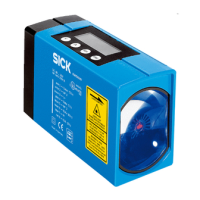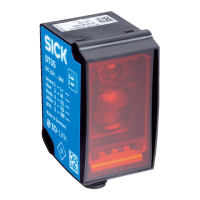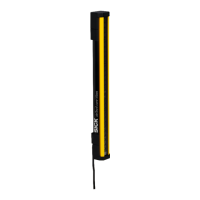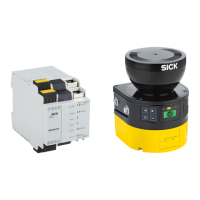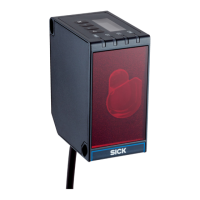
Do you have a question about the SICK DT80 IO-Link and is the answer not in the manual?
| Brand | SICK |
|---|---|
| Model | DT80 IO-Link |
| Category | Accessories |
| Language | English |
Introduction to the DT80 IO-Link as a distance sensor.
Details on product variants with IO-Link and Ethernet interfaces, manufacturer, and legal information.
Explains document usage, target audience, further information, and symbol conventions.
Covers intended use, improper use, cybersecurity, personnel qualification, and operational hazards.
Details warning signs on the device, focusing on laser safety classifications and precautions.
Explains how to identify the product using SICK ID and the type label details.
Details the IO-Link interface, supported functions, documentation, accessories, and scope of delivery.
Overview of the device's status LEDs, display, and operating buttons.
Guidelines for safe transport, unpacking, inspection, and proper storage conditions.
Recommendations for selecting a mounting site and general mounting instructions.
Step-by-step guide for physically attaching and aligning the sensor.
Detailed instructions for wiring, connection diagrams, and electrical hookup.
How to integrate the sensor into an IO-Link network and master system.
General operating principles, notes on handling, and explanation of status LEDs.
Description of the device's TFT display, RUN mode, and the function of the operating buttons.
Overview of the main menu structure and quick setup options for cycle time.
Guidance on using the SOPAS ET software for parameterization and diagnostics.
Steps for parameterizing the device using SOPAS ET and a SiLink master.
Key technical properties of the device's IO-Link interface, including specification and cycle time.
How to configure the sensor via IO-Link using SiLink box or IO-Link Master.
Details on available process data formats and how to configure them.
Transmitting device data and accessing it via IO-Link using IODD.
Configuring measurement cycle time and setting a distance offset value.
Configuring measured value filters and handling 'no echo' situations.
Adjusting display brightness and controlling the measuring laser.
Procedures for factory reset and configuring the active state logic for outputs.
Setting hysteresis for stable switching and configuring Output Q1 modes.
Configuring a single switching point for the Q1 digital output.
Setting up a switching window with SP1 and SP2 for the Q1 digital output.
Setting Output Q1 using a switching point with an offset reference.
Configuring Output Q2 as an analog current (4-20mA) or voltage (0-10V) output.
Details on 4-20 mA current and 0-10 V voltage output functions for Q2.
Configuration of Q2 as a digital output with modes like Single-point, Alarm, SLW, etc.
Configuring Q2 for alarm signals, signal level warnings, and complementary output functions.
Setting up the In1 input and controlling the measuring laser via input or software.
Setting custom initialization values for distance output via preset.
Accessing device info (HW/SW versions) and using the Find device function.
Guidelines for cleaning the front screen and housing, including safety precautions.
Recommended preventive maintenance tasks, intervals, and responsibilities.
Table of common problems, causes, and corrective actions for device operation.
How the device detects, displays, and stores internal error states.
Detailed list of error codes, their meanings, and specific remedial actions.
Guidelines for device repair, return process, and environmentally sound disposal.
Using IO-Link Data Storage for parameter backup and restoration during sensor replacement.
Key performance metrics like measuring range, resolution, repeatability, and accuracy.
Table detailing response times based on output time settings and object/filter dependencies.
Details on digital output, analog output, and digital input interfaces supported by the device.
Technical specifications for the IO-Link interface, including max cable length.
Specifications for supply voltage, power consumption, housing, dimensions, and display.
Data on vibration resistance, shock resistance, ambient light immunity, and temperature limits.
Visual representation of device dimensions, mounting points, and optical axis locations.
Information on how to find available accessories and related installation details.
Information on obtaining product conformity declarations and certificates from the manufacturer.
Details regarding the open-source software licenses used within the product.
